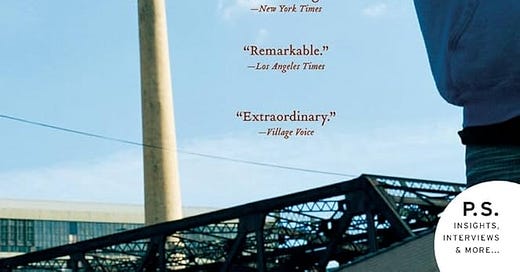The Mysteries of Pittsburgh, Michael Chabon (1988). I’ve been meaning to get into some Michael Chabon for a while. The Amazing Adventures of Kavalier and Clay, his Pulitzer Prize winner, is obviously the one everybody has heard of, but I had a notion that I’d start off with his debut novel, see what that was about, and have a little more context and a sense of Chabon before getting on eventually to Kavalier & Clay.
The Mysteries of Pittsburgh was actually Chabon’s masters thesis at UC Irvine; his advisor submitted it for publication (good advisor!) and it became a surprise bestseller, catapulting the author to fame at the young age of 25. It fits pretty straightforwardly into the genre of the bildungsroman or coming-of-age novel. Protagonist Art Bechstein, who seems more or less an exact stand-in for Chabon, is, as the title suggests, in Pittsburgh, where he wonders what to do with himself in the summer following college graduation. He has a strained relationship with his shady, mob-connected father, and sort of drifts passively into two sexual relationships, one with a woman named Phlox and one with a man named (like him) Arthur.
I guess in terms of age I’m dead on in the target audience here; I was engaged in somewhat analogous adventures in New York City around the same time, dropping out of college in 1989, the year after Mysteries was published. And while I wasn’t wondering what to do with my life - I was laser-focused on being a musician - I do definitely recognize the mood, the vibe, the outlook of the book’s characters. Perhaps it’s a dated cliché at this point, but the “slacker” mentality associated with the 90s seems very much in evidence, which I guess was kind of a reaction against the acquisitiveness and competitiveness so valorized in the 80s. But it’s not overdone in this book; it feels natural and authentic.
All the young characters in the book are drifting and confused, luxuriating in an utter lack of urgency or acquisitiveness, suffused with a youthful notion of life’s everlastingness. To them, anything is possible and nothing is particularly pressing. Really, The Mysteries of Pittsburgh is little more than a mood, the taste of a fleeting moment when several lives intersected. But it’s a mood so subtly and skillfully rendered that I get why it was so appealing in its moment.
My edition contains a postscript by Chabon about the book’s creation. In it he says the book was mainly an attempt to emulate influences from Proust to Roth and especially Fitzgerald’s The Great Gatsby. But that seems to be a little too modest. Mysteries may not be a masterpiece but I would say it’s a genuinely original creation and a worthy addition to the category of American coming of age stories like Catcher in the Rye or A Separate Peace. (Read early October, 2024)




